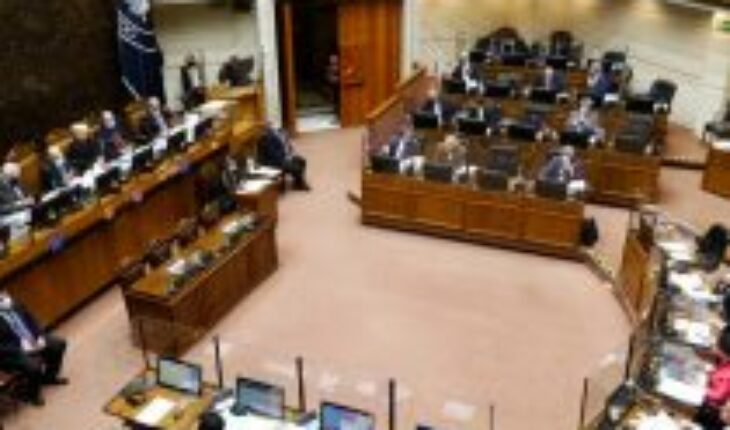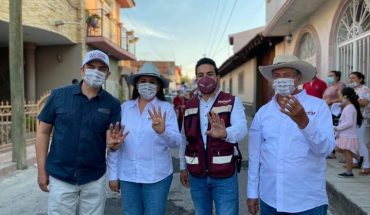Without surprises, this Tuesday, November 11, with 27 votes in favor, 10 against and one abstention, the Senate approved the Comprehensive and Progressive Treaty of Trans-Pacific Partnership – better known as TPP11 – in the last legislative procedure to give the go-ahead to the international agreement that Chile signed in March 2018. While most of the votes against came from the ruling party – especially from sectors of Apruebo Dignidad – from the Government Foreign Minister Antonia Urrejola reaffirmed that President Gabriel Boric will wait for the bilateral letters (side letters), before promulgating the bustling treaty.
Precisely from Apruebo Dignidad they assure that, after this vote, there are still steps for the agreement to enter into force, because the country must deposit the pact. A source within this coalition explains that another member country of the pact must act as a “judge of guarantee”, allowing the treaty to be effectively signed, a role that in this case falls to New Zealand.
In that sense, the same source details that “once the approval by all the powers of the State occurs, President Boric will keep the signed document, and will not make the deposit so that it begins to work and to govern, until he has the side letters or bilateral letters, which also have to be approved by Congress.”
An “invention-loophole” that allows to save time and delay the process, in the opinion of other sectors. However, from La Moneda they believe that it is an intelligent strategy, assuming that the President is not in a position to withdraw the project, understanding that this action would have caused a huge overreaction from sectors of opposition and center-left, from where they have demanded the approval of the treaty, after more than four years of processing. Now, they assume from Apruebo Dignidad that the President will not make the deposit of the TPP11 as long as he does not have the commitment of the largest economies that conflicts are not arbitrated in international courts.
It should be remembered that, although at first the Government had decided not to hinder the legislative process of the treaty – which is not part of the program with which it won the elections and arrived in La Moneda – in recent weeks it chose to assume an active role through the negotiation of bilateral letters with the rest of the countries, so that the settlement of disputes between member States and investors (detailed in Chapter 9 of the agreement) is not applicable.
In this regard, Foreign Minister Antonia Urrejola said that what is sought is “to give a relative political signal in advancing in modernizing the standards currently existing in terms of investor-state dispute resolution, also creating within the TPP11 forum itself a critical mass, together with other countries, that allows to debate and perfect the mechanisms contemplated in this trade agreement.”
In addition, the Minister of Foreign Affairs ratified that the bilateral letters must be approved by Congress, adding that the President “has decided, within his exclusive powers, to wait for the progress of the side letters before ratifying the agreement.”
The attached letters relate to a mechanism widely used in the different preferential trade agreements, with different objectives. In this case, the proposal, which has already been used by New Zealand with 5 countries from the treaty, seeks to exclude the dispute settlement system between private investors and the state.
The deployment of the “constitutionality reserve”
Since Apruebo Dignidad, sectors such as the PC, the FRVS and the Frente Amplio have demonstrated their position against the approval of the TPP11. In addition, during the debate in the Chamber, the independent senator Karin Bianchi made a reservation of constitutionality, appealing that – in his opinion – the procedure incurred a “vice of legality”, for not having consulted the opinion of the Supreme Court before reaching the vote in the Upper House.
In that sense, the parliamentarian for the Magallanes Region said that the “Constitution is categorical, in that it orders that all conflicts that are promoted within the territory of the Republic must be submitted to the jurisdiction of the national courts. (About) chapters 9 and 28 of the treaty that provide for the submission of disputes to international arbitral tribunals, here the Supreme Court has not been heard, a requirement that is fundamental for it to be reachedr to this instance. I believe that here there will be a vice of legality regarding this, and I anticipate making the reservation, “he said.
However, they recognize from different benches of the Senate, it is unlikely that this strategy will have an effect, in the attempt to delay a discussion that is already settled and that only has side letters as the last barrier. In this regard, different academic voices and experts in international treaties believe that the debate around the TPP11 has become a banner of political struggle, rather than economic transformation.
On how the Government headed by President Boric has administered the approval of this treaty, Senator Francisco Huenchumilla (DC) admitted that it was necessary to “give the Executive an opportunity to make complementary agreements”, in relation to some doubts that the ruling party eventually had regarding the resolution of conflicts and controversies with the application of the treaty. In addition, the parliamentarian was in favor of having granted the Government the power to process bilateral letters with the respective countries.
Recall that the TPP11 is the third largest Free Trade Agreement on the planet, after CETA (between Canada and the European Union) and the USMCA (Canada, United States and Mexico) and is made up of 11 Asia-Pacific countries: Australia, Japan, Singapore, Vietnam, Brunei Darussalam, Canada, Malaysia, Mexico, New Zealand, Peru and Chile.
The agreement – according to its promoters – will allow the entry of Chilean products with zero tariff to markets totaling 502 million people. The most benefited sectors would be agriculture and fishing, dairy and meat, in addition to forestry. It also covers labour, gender and environmental issues. Even so, despite the benefits it would eventually bring, its eventual ratification counts numerous detractors, expressed this in the demonstrations that have taken place in the front of the National Congress, every time it is discussed in the Senate.
It should also be considered that the original TPP, promoted by the United States, was the subject of much criticism, and that when Donald Trump announced that his country was withdrawing from the treaty, in March 2017, former President Michelle Bachelet summoned the States Parties to an appointment in Viña del Mar with the aim of analyzing the scenario, after the American decision. Based on a series of negotiations by the remaining 11 states, the agreement was reformulated with the aim of nullifying several controversial provisions – particularly in the field of intellectual property – signing a new treaty in February 2018, with former Foreign Minister Heraldo Muñoz as one of its main promoters. Now, four years later, the discussion remains unresolved, waiting for the bilateral letters to settle a debate that, in recent times, has been more political than economic.
Follow us on





